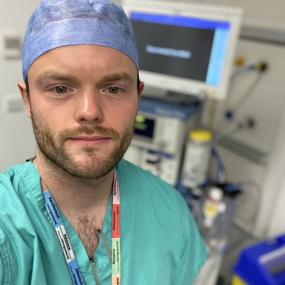Should Intensive Care Medicine Registrars have training in Palliative Care?

Stuart is an ST5 in Anaesthetics and Intensive Care Medicine in South East Scotland. He is currently the Honorary Secretary of the Association of Anaesthetists Trainee Committee and has interests in obstetric critical care, neuroanaesthesia, diversity, and leadership in healthcare.
Working in intensive care unfortunately comes hand in hand with seeing patients at the end of their life on a fairly regular basis. Recognising when someone is dying and feeling confident enough in our skillset to provide a ‘good death’ can be challenging.
I recently asked to spend some time working with our palliative care teams as part of my time in medicine during Stage 1 Training. I’m lucky enough to have a very helpful and understanding TPD and local palliative care department who were more than happy to facilitate this. I’ve jotted down a few things I learned:
- In medicine, we are generally poor at asking patients or their loved ones what they want.
Palliative care medicine aims to centre this, and hinge everything around the patient’s wishes. Even in cases of prognostic uncertainty, honest conversations about what matters most serve as a linchpin for directing where we take the management strategy.
- The institution of healthcare makes it very difficult for a patient to say ‘no’.
I’ve seen it on so many occasions where a patient decides not to have an operation/chemotherapy/critical care admission, and they are subjected to repeated conversations with multiple specialties over and over again in order to ‘prove’ their rationale. It is not uncommon in this circumstance for patients to have formal psychiatry assessment of capacity, just to be sure.
- Powers of communication are everything.
Watching an experienced Palliative Care Consultant manoeuvre a complex discussion surrounding end of life care (patient wishes, family concerns, parent specialty views) has a feel of watching a surgeon with an untouchable level of skill locate and ligate a bleeding vessel in a haemorrhage. I personally feel we undervalue this level of skill. Spending time in palliative care allowed me to practice this very regularly every day, almost like doing spinals in an obstetric rotation of anaesthesia. The ability to repeatedly experience, practice, reflect, and improve meant that I saw myself improve markedly over time.
- There is such a thing as a ‘good death’, and intensive care has the ability to provide it if we try.
I sometimes wonder if the attitude towards death in critical care is that we reflexively see it as failure. After all, the patients we look after are self-selected as ones we think have the best chance of survival. Investing ourselves in working with the patient and their family to recognise what is achievable and not, could help us more confidently move to energising our care in a different direction. We (usually) have the nursing staff ratios, space, peace, and core skillset for symptom management to be able to do this well.
- You’d think that seeing so much death would be very injuring for specialists in palliative care. In fact, it has one of the highest nursing retention rates of any specialty.
Death is not seen as a poor outcome. Instead, providing a good death is seen as a source of achievement and fulfilment.
I gained a huge amount from my time working with palliative care physicians and specialist nurses, and am hugely thankful to them for all I’ve learned. The subtleties and nuances of communication, medical symptom management, and centring of care have absolutely changed the way I approach the increasingly old, comorbid, and complex patient cohort we see in critical care. I would certainly make a case for all trainees spending some time with them. After all, if our specialty only ever sees a few ‘types’ of death in our training, we can never hope to change our practice for the future.
